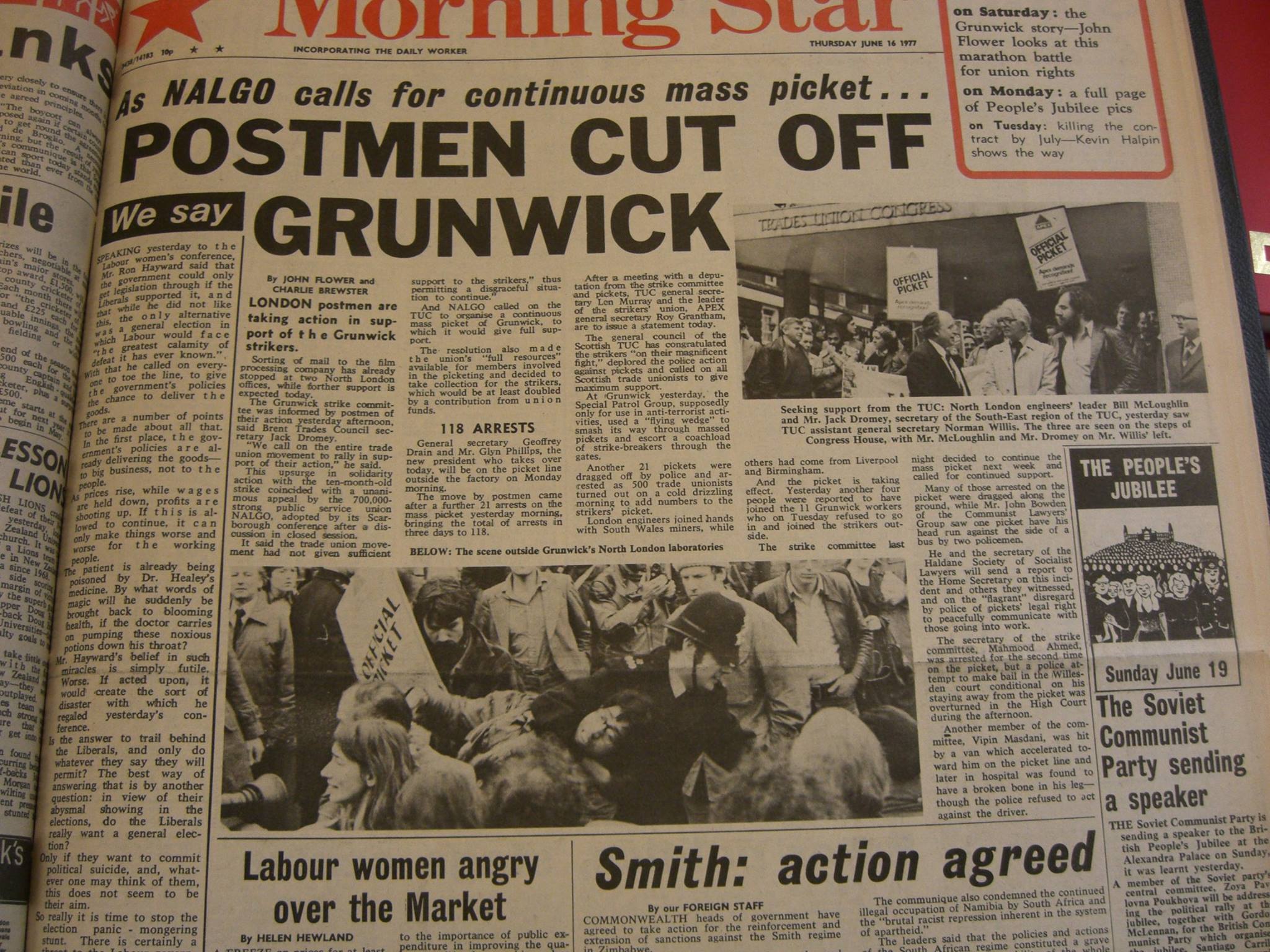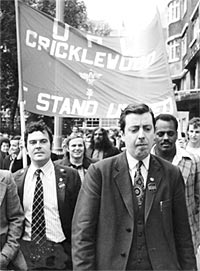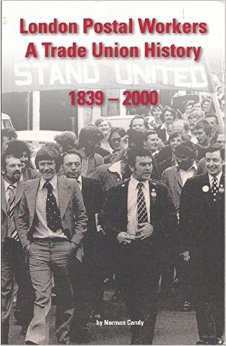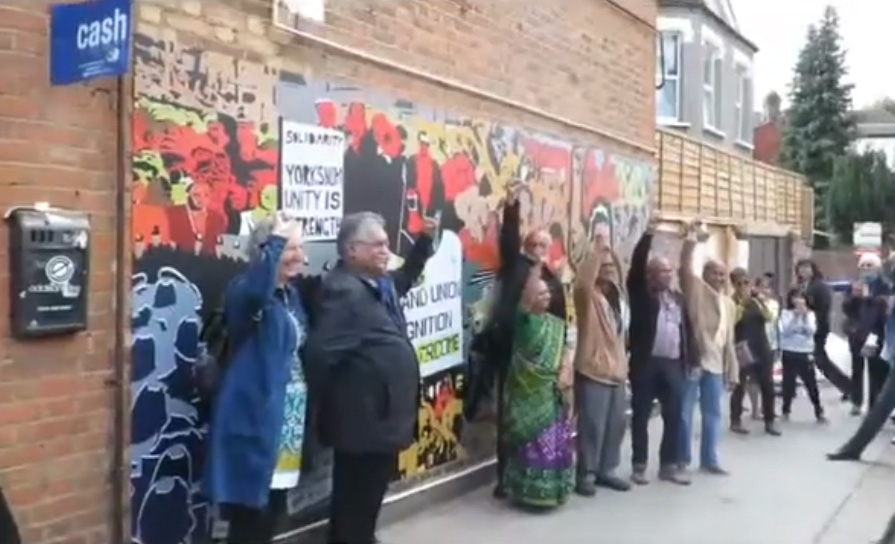Grunwick Dispute
Category: Equality, History

The Grunwick dispute ran for two years from 1976 to 1978. The dispute was originally based around management practices and the treatment of the employees. From small beginnings, it grew into one of the most important disputes in trade union history and, it could be argued, changed successive government strategy in dealing with strikes and paved the way towards the repressive anti trade union laws we have today.
But it also marked a change in the way ethnic minority workers were viewed within the trade union movement, and saw workers from all over the country gathering in a small North London street in support of a group of predominantly Asian, female workers.
One of the key actions of the dispute was the decision by the local UPW branch to boycott Grunwick mail in solidarity with the strike.
The following course contains a number of interviews, videos and archive resources on the dispute.
Disclaimer: The views and opinions expressed in reference materials provided with this course this course are those of the various contributors and do not necessarily reflect the official policy or position of the CWU.
Grunwick: An Introduction
Grunwick was a mail order film processing company, probably one of the first in the UK. It employed predominantly female workers, many of whom were recent immigrants to the UK. Conditions in the factory were harsh with poor facilities, particularly in the heat of the summer – and the summer of 1976 was one of the hottest on record.
Matters came to a head on 20 August 1976 when factory manager, Malcolm Alden, sacked Mr Devshi Bundi after an argument. He was quickly joined by three of his colleagues. Later that same day, Mrs Jayaben Desai and her son walked out after an argument with the same manager. On 23 August, they formed a picket outside the factory and were quickly joined by 50 other workers. They contacted APEX trade union and Brent Trades Council, and by 31 August they were all members of the union, who declared the strike official.
As Grunwick was a mail order firm, the decision of the local UPW branch to boycott Grunwick mail was a pivotal decision. However, this action was deemed to be illegal. Throughout the dispute, the application of the law and the policing of the dispute was shown to be far from even-handed. The tactics used at Grunwick were seen to be a precursor to disputes such as the Miners’ Strike of the 1980s.
Although the strike was ultimately unsuccessful, it has come to be seen as a turning point – not only in how it was policed but also in how unions perceived minority workers. Where ten years previously, some had taken to the streets in support of Enoch Powell, now predominantly white, male trade unionists were prepared to face the sack or arrest in support of predominantly female, Asian workers.
Jayaben Desai
A key figure in the Grunwick dispute was Jayaben Desai. It was she who led the walkout of the Grunwick Film Processing Laboratories in the summer of 1976.
Originally from India, she had arrived in Britain eight years previously, after migrating to Tanzania.
Jack Dromey MP, who was secretary of the Brent Trades Council during the dispute, remembers her as, “a quite remarkable woman with an absolutely extraordinary turn of phrase.”
Perhaps her best-known statement was issued in confrontation with a manager at Grunwick, who she told: “What you are running here is not a factory, it is a zoo. In a zoo, there are many types of animals. Some are monkeys who dance on your fingertips, others are lions who can bite your head off. We are those lions, Mr Manager.”
Professor Ruth Pearson from Leeds University, who conducted a research initiative into Asian female strikers, recalled her support for women dismissed by Gate Gourmet, the airline catering firm with a processing plant near Heathrow.
“At one of the benefits for the workers sacked by Gate Gourmet in 2005, she sent a congratulatory message and a cheque from herself as the strike leader of the Grunwick dispute,” Pearson said. “She recognised that because of the actions taken by herself and her co-strikers, Asian women today are able to join trade unions, to take industrial action.”
Jayaben Desai – Obituary in The Guardian
Read the obituary written by Jack Dromey for the Guardian on 28 December 2010.
Read Full ObituaryStriking Women Comic Strip
This comic was published by the University of Lincoln, with storyline and text by Sundari Anitha and Ruth Pearson.
Download Comic StripGrunwick & The UPW

As we have seen, the decision of UPW postal workers to boycott Grunwick’s mail was a pivotal event in the strike.
Grunwick’s owner, George Ward, described the action as “a threat to our jugular”. The Cricklewood Branch had refused to cross the picket line since the beginning of the dispute but the company had been working around this by picking up their mail directly from the office. As the dispute escalated, Branch Secretary, Archie Sinclair, and Branch Chair, Colin Maloney, and all the members of the branch were to find themselves at the heart of one of the most memorable disputes in trade union history.

Tom Jackson
In October 1976, Roy Grantham, General Secretary of APEX, asked Tom Jackson, General Secretary of the UPW, for support. On 1 November, the NEC voted to instruct UPW members not to handle Grunwick’s mail.
The very next day, George Ward agreed to meet ACAS, offering to negotiate if the boycott of his mail was lifted.
However, local Conservative MP, John Gorst, was a member of the National Association For Freedom (NAFF). This was a well-financed organisation of anti-union employers and their political supporters. They were threatening legal action against the UPW and encouraging Conservative MPs to put further pressure on the Labour Government of the time. The UPW’s solicitors advised that the boycott could be in breach of the 1953 Post Office Act and NAFF’s legal action could result in huge fines and legal costs. As a result the UPW Executive lifted the boycott.
NAFF’s campaign had the support of the media and the Conservative front bench – and when ACAS advised Grunwick to recognise and negotiate with APEX, the company responded by suing ACAS! Furthermore, when the Government established a court of enquiry, Grunwick management rejected their findings as well.
Meanwhile, the Metropolitan Police sent in the Special Patrol Group (SPG), a group set up to counter terrorist threats and public disorder, to arrest peaceful pickets. The Cricklewood Branch voted to continue the boycott and they were backed in this by the London District Council (LDC). A great deal of pressure was put on both to lift the boycott, both by the UPW nationally (as this was now considered unofficial action) and by George Ward and NAFF, threatening the officers of the Cricklewood Branch with legal action.
Tom Jackson called a special meeting of the LDC and argued that the union would be unable to protect branch and district officials who he argued were committing a criminal offence by willfully delaying the mail. He also argued that their unofficial action could prejudice findings of the ACAS and government enquiry.
As a result the LDC voted to lift the boycott.
 The Cricklewood Branch vowed to continue the boycott. Management suspended 113 postal workers and locked the office. Management then allowed NAFF to enter the building at 2am to remove the Grunwick mail. NAFF had 250 people on hand to reintroduce the Grunwick mail back into the postal network.
The Cricklewood Branch vowed to continue the boycott. Management suspended 113 postal workers and locked the office. Management then allowed NAFF to enter the building at 2am to remove the Grunwick mail. NAFF had 250 people on hand to reintroduce the Grunwick mail back into the postal network.
NAFF’s intrusion into the mail network provided Jackson with the opportunity to make the Cricklewood dispute official again – but his proposition was narrowly defeated by the NEC. Then Tom Jackson went on holiday.
Deputy General Secretary, Norman Stagg, took charge. He agreed to Grunwick removing a further 63 bags of mail from the office. He also warned that the actions of the Cricklewood Branch of exposing the whole union’s funds to sequestration, and NEC agreed to suspend hardship payments to the branch.
The branch was called to a meeting where they were told that if they did not call off their action they would be expelled from the union, dismissed by the Post Office and lose their pensions. Even in the face of all this pressure, the vote to end the boycott was only carried by 49 votes to 46.
Subsequently the UPW’s discipline committee fined John Taylor, Derek Walsh and other members of the LDC between £500 and £1,000 for their part in the unofficial boycott. They received donations from branches and individuals from across the country, and an appeal from Jack Dromey of Brent Trades Council saw so many donations that money had to be returned!
In 2012, the CWU’s Annual Conference bestowed National Honorary Membership to Derek Walsh and Colin Maloney on behalf of all those disciplined by the union, in recognition of the outstanding contribution they made to trade unionism.
For a more detailed account of the Grunwick Dispute, we recommend you read Chapter 14 of London Postal Workers: A Trade Union History by Norman Candy.

Remembering Grunwick
On 14 December 2015, the CWU Education & Training Department invited a group of senior activists to discuss their memories of Grunwick.
The participants were:
- Colin Maloney, ex Chair UPW Cricklewood Branch & National Honoury Member of the CWU
- John Geleit, ex NGA official
- Norman Candy, CWU, ex LDC, NEC, Policy Advisor and author of London Postal Workers: A Trade Union History
- Jim Moher, ex CWU National Legal Officer, Brent Trades Council, author of Trade Unions & The Law: The Politics Of Change On Government Policies and founding member of the History & Policy Trade Union Forum
Video: The Great Grunwick Strike
Brent Trade Union Council was heavily involved in assisting the Grunwick strikers and commissioned this video to mark 30 years since the end of the dispute.
The video below examines the ability of the employer to deny the workers union membership and the role of the courts in settling the strike.
Video director, Chris Thomas, spent considerable time tracking down most of the major figures from the strike. As a result the video features both original footage and extensive contemporary interviews with ordinary strikers, members of the strike committee and a wide range of those involved in supporting the strike.
The magnificent solidarity action by the Cricklewood postal workers is also highlighted.
The film is both inspirational and instructive, ideal for showing at union branch meetings or trades council meetings.

Video running time 1 hour 4 minutes. Directed by Chris Thomas, produced by Brent Trades Union Council. DVD copy available from Brent TUC, 375 High Road, Willesden, London, NW10 2JR. Price £10 including p&p.
Additional Reading
- George Ward Obituary, The Independent, 1 May 2012
- National Association for Freedom (NAFF), Wikipedia
- The intersectional politics of the Grunwick strike, New Historical Express
- Working Lives: Gender, Migration and Employment in Britain, 1945-2007
- Grunwick Dispute – Files Overview, Special Branch Files Project
- Grunwick boss dies – The lessons of Grunwick, Workers’ Liberty
Grunwick 40
Grunwick 40 was a project initiated by Brent Trades Council and the Willesden Green Town Team. 40 years after the start of the Grunwick Strike, they wanted to celebrate the bravery of the strikers and take their inspirational story to a new generation by installing a mural, developing an exhibition and holding a conference.

Two murals were unveiled on 30 September 2017.
Click to watch the unveiling ceremony of the smaller mural on Chapter Road, opposite the old Grunwick factory site.
The speakers were Sujata Aurora (chair of Grunwick 40), Anna Ferrie (artist), Mahmood Ahmed (former striker and secretary of the Strike Committee), Vipin Magdani and Laxshmiben Patel (former strikers).





